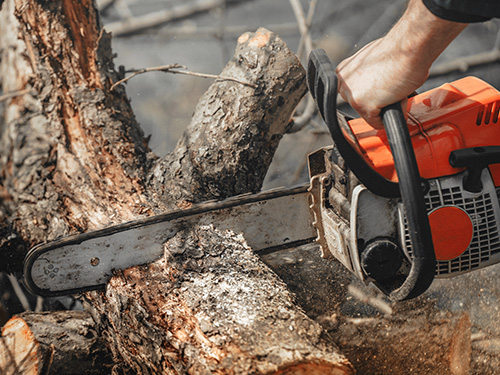Chainsaw Maintenance: Keeping Your Tool Sharp and Ready
Nov 04, 2024

A chainsaw is essential for tackling tough jobs like felling trees or clearing fallen limbs. However, when your chainsaw starts to feel sluggish and struggles to cut, it’s often a sign that the chain needs sharpening. Regular sharpening can save you time, money, and energy – plus, it’s a task you can easily handle yourself with a few basic tools.
Essential Tools for Sharpening Your Chainsaw
While many manufacturers have brand-specific sharpening tools, there are standard items that work well with most chainsaws:
When to Sharpen Your Chain
Signs your chain needs sharpening include excessive sawdust instead of wood chips and increased effort needed to cut. Many users sharpen their chains every two to three tank refills, ensuring each chain stays efficient. A sharp chain makes cutting easier, safer, and helps extend the life of your chainsaw.
Quick Sharpening Steps
Safety Tips
Always wear safety gear, follow your chainsaw’s manual for the correct angles, and take your time to avoid mistakes. A well-maintained, sharp chain not only cuts better but also reduces the chance of dangerous kickback.
Sometimes, it’s best to replace your chain rather than sharpening it. If your chain has been sharpened repeatedly and the cutting teeth are noticeably shorter, usually around 4 millimeters or less, it may no longer hold a sharp edge effectively. Chains with visible damage, like broken teeth or cracks, should also be replaced to maintain safety and performance.
When it’s time to purchase a new chain, or even a new chainsaw entirely, many of your local Co-ops carry a variety to choose from. Whether you need something for heavy-duty use or rather for light, occasional work, Co-op’s knowledgeable staff can guide you to the perfect fit. Plus, they can offer helpful tips on maintenance and care, so you get the most life out of your chainsaw.
Find the nearest location here. For more content like this, check out the latest issue of The Cooperator.
Essential Tools for Sharpening Your Chainsaw
While many manufacturers have brand-specific sharpening tools, there are standard items that work well with most chainsaws:
- Round file (specific to your chain size, such as 5/32 in., 3/16 in., or 7/32 in.)
- Flat file to adjust the depth gauge
- File guide to ensure proper angles
- Depth-gauge guide to maintain safe cutting depth
- Safety goggles and work gloves for protection
When to Sharpen Your Chain
Signs your chain needs sharpening include excessive sawdust instead of wood chips and increased effort needed to cut. Many users sharpen their chains every two to three tank refills, ensuring each chain stays efficient. A sharp chain makes cutting easier, safer, and helps extend the life of your chainsaw.
Quick Sharpening Steps
- Secure the Chainsaw: Lock the guide bar in place, using a vise if available.
- Clean the Chain: Remove any debris.
- File the Cutting Teeth: Use the round file at the specified angle and apply steady pressure.
- Check Depth Gauges: Use a depth gauge guide and adjust with the flat file if needed.
- Recheck Chain Tension: Ensure the chain is properly tensioned before starting.
Safety Tips
Always wear safety gear, follow your chainsaw’s manual for the correct angles, and take your time to avoid mistakes. A well-maintained, sharp chain not only cuts better but also reduces the chance of dangerous kickback.
Sometimes, it’s best to replace your chain rather than sharpening it. If your chain has been sharpened repeatedly and the cutting teeth are noticeably shorter, usually around 4 millimeters or less, it may no longer hold a sharp edge effectively. Chains with visible damage, like broken teeth or cracks, should also be replaced to maintain safety and performance.
When it’s time to purchase a new chain, or even a new chainsaw entirely, many of your local Co-ops carry a variety to choose from. Whether you need something for heavy-duty use or rather for light, occasional work, Co-op’s knowledgeable staff can guide you to the perfect fit. Plus, they can offer helpful tips on maintenance and care, so you get the most life out of your chainsaw.
Find the nearest location here. For more content like this, check out the latest issue of The Cooperator.